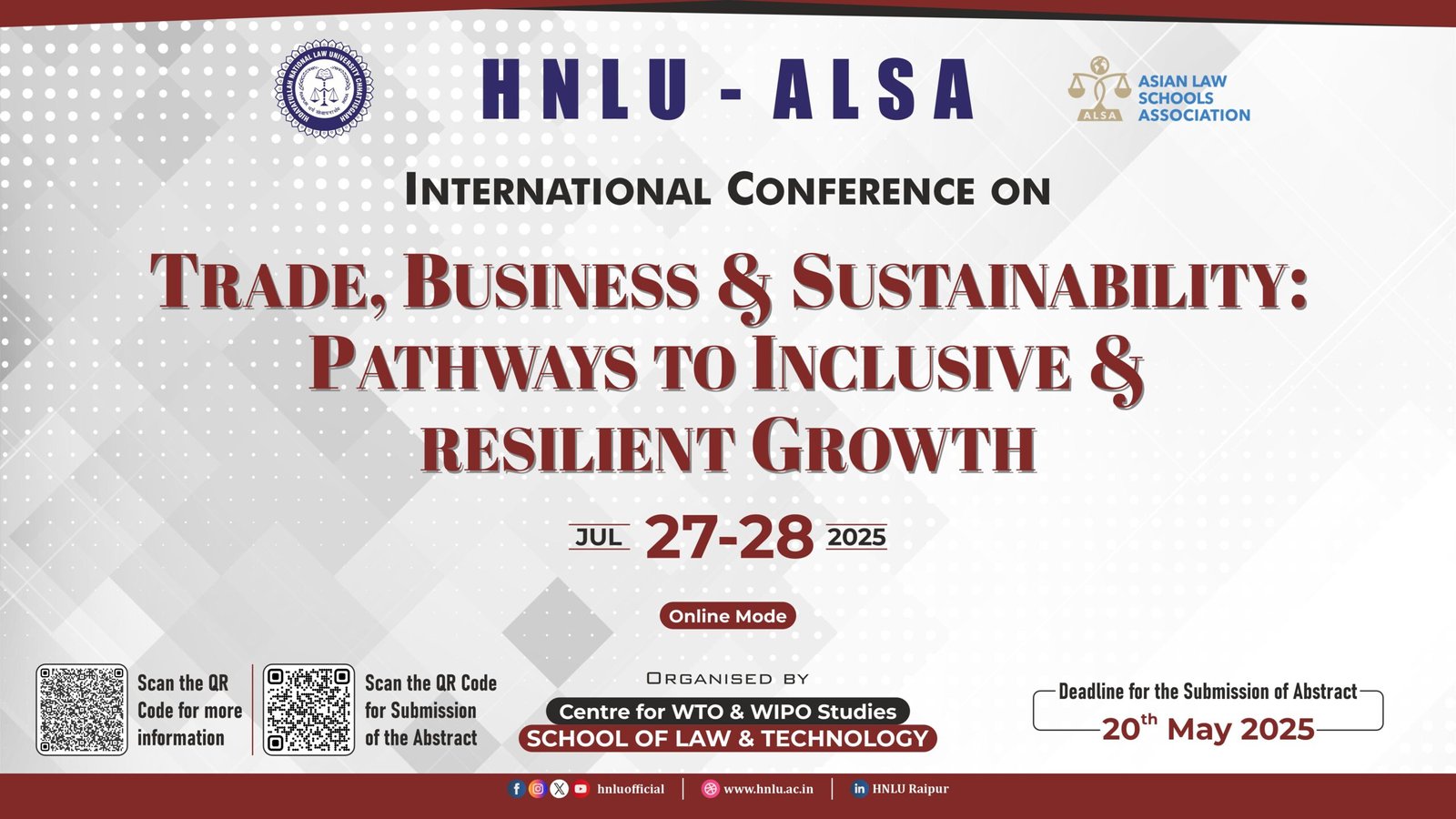
International Conference on Trade, Business, and Sustainability by HNLU, Raipur: Submit by May 20
About Hidayatullah National Law University (HNLU), Raipur
Established in 2003, Hidayatullah National Law University is a premier institution for legal education and research in India. Now in its 21st year, HNLU is guided by its motto “Dharma Sansthapanartham” — for the sake of establishing the primacy of laws of eternal values. The university is committed to shaping legal professionals who are not only academically proficient but also socially responsible.
About the School for Law & Technology and the Centre for WTO & WIPO Studies
The School for Law & Technology (SLT) at HNLU serves as a specialized research hub, focusing on areas such as intellectual property rights, data privacy, cybersecurity, digital commerce, artificial intelligence, and the intersection of technology and public policy.
The Centre for WTO & WIPO Studies, under SLT, promotes scholarship and research in international trade and intellectual property rights within the frameworks of the World Trade Organization (WTO) and the World Intellectual Property Organization (WIPO). The Centre aims to influence policymaking through informed analysis and global cooperation.
About the Asian Law Schools Association (ALSA)
Founded on 1 September 2020, the Asian Law Schools Association (ALSA) is a non-profit body comprising 28 founding member institutions across Asia. It seeks to enhance the quality of legal education and foster cross-border academic collaboration. ALSA upholds core values such as academic freedom, the rule of law, diversity, justice, and fairness.
About the ALSA Chapter on Environment and Sustainability
The Chapter on Environment and Sustainability brings together scholars and practitioners from ALSA member institutions engaged in environmental law, climate change, energy law, and related disciplines. It serves as a platform for collaborative research, policy discussion, and academic exchange on legal aspects of sustainability and the green transition.
About the International Conference
Theme: Trade, Business, and Sustainability: Pathways to Inclusive and Resilient Growth
Dates: 27–28 July 2025 (Online Mode)
Occasion: Commemorating World Nature Conservation Day
The relationship between global trade, business practices, and sustainability is gaining prominence as nations adapt to climate goals and regulatory reforms. Trade has become a key enabler of green, inclusive, and resilient growth. This international conference aims to explore this nexus by bringing together experts to deliberate on regulatory frameworks, market mechanisms, policy challenges, and the role of law in driving sustainable development.
Indicative Sub-Themes
- Eco-Labelling and Market Access
- Carbon Border Tax Adjustments (CBTAs) and Low-Income Countries
- Integration of ESG (Environmental, Social, and Governance) Metrics
- Greening Trade: Global Value Chains and Emissions
- Inclusive Trade: Green Financing and Climate Investments
- Digital Tools for Sustainability
- Sustainable Consumer Behaviour
- Decarbonising Global Transport
- Post-Pandemic Economic Reconstruction
- Economic Inclusiveness and Environmental Protection
Note: These are suggestive themes. Papers outside these areas, but within the conference theme, are also welcome.
Conference Structure
- Inaugural and Valedictory Sessions
- Module 1: Thematic Panel Discussions
- Navigating the Green Trade Maze: Eco-Labels, CBTAs, and Market Access
- ESG Integration and Green Finance in Post-Pandemic Supply Chains
- Module 2: Technical Paper Presentation Sessions (parallel tracks)
Call for Papers
Eligibility: Academicians, professionals, researchers, and students in the field of law.
Language: English
Submission Format:
- MS Word, Times New Roman, Font Size 12, 1.5 line spacing, 1-inch margins
- Word Limit: up to 10,000 (including abstract and keywords)
- Citation Style: Bluebook 20th Edition
Important Dates
- Abstract Submission Deadline: 20 May 2025
- Abstract Acceptance Notification: 20 June 2025
- Full Paper Submission, Registration & Payment Deadline: 15 July 2025
- Conference Dates: 27–28 July 2025
Registration Fee (Payable upon acceptance of abstract)
Indian Participants:
- Academicians/Professionals: ₹1200
- Research Scholars/Students: ₹1000
Foreign Participants:
- Academicians/Professionals: USD 50
- Research Scholars/Students: USD 40
Fee waiver available for ALSA chapter members and HNLU students/faculty upon request.
Bank Details
- Account Holder: Registrar, Hidayatullah National Law University, Raipur
- Bank Name: State Bank of India
- Account No.: 41394244908
- IFSC: SBIN0018097
- SWIFT Code (Foreign Participants): SBININBB646
Submission Instructions
- Abstracts (max 500 words + 5 keywords) must include a short bio-note (60 words) with contact details.
- File name format: FullName_AbstractTitle (e.g., Ananya_EcoLabellingAndTrade.docx)
- Submit abstract by scanning the provided QR code or visiting the conference portal.
Contact
Dr. Ankit Awasthi
Conference Secretary
Head, Centre for WTO & WIPO Studies
School for Law & Technology, HNLU Raipur
📧 Email: cws@hnlu.ac.in | 📞 +91 73552 35075
Date And Time
2025-07-28
Registration End Date
2025-05-20Event Category
Share With Friends
Organizer
Established in 2003, Hidayatullah National Law University has completed the journey of more than one and half a decade. In such a short span of time, HNLU has carved out a niche in the realm of legal education across India and the legacy is soaring towards newer heights day by day.
Named after the great legal luminary Justice Mohammed Hidayatullah, the University was established by the Government of Chhattisgarh under the Hidayatullah National University of Law, Chhattisgarh, Act (Act No.10 of 2003).
HNLU is the sixth in the series of National Law Schools across India. HNLU has been included in the list of the Universities maintained by the University Grants Commission under Section 2(f) of the UGC Act, 1956 and has been declared fit to receive Central assistance in terms of the rules framed under Section 12 (B) of the UGC Act, 1956. The university is recognized by the Bar Council of India under section 7 of the Advocates Act 1961.

